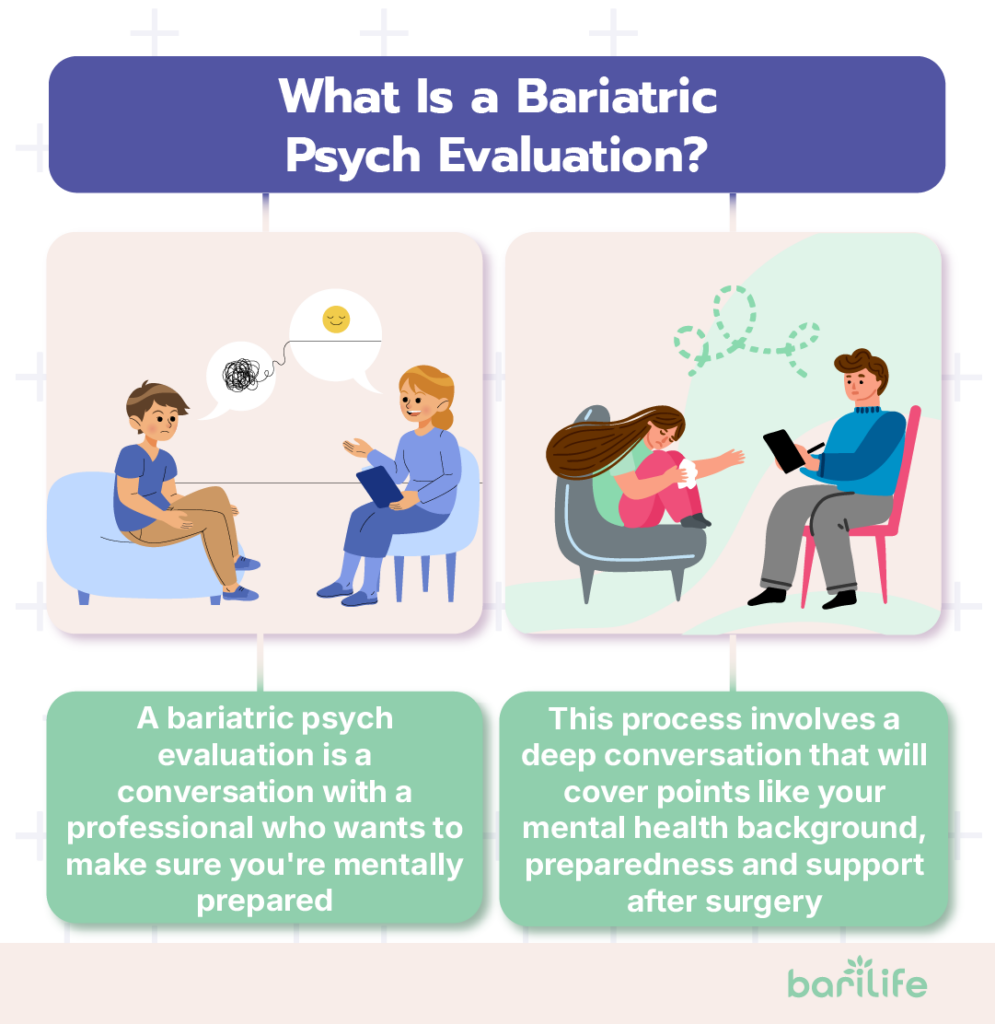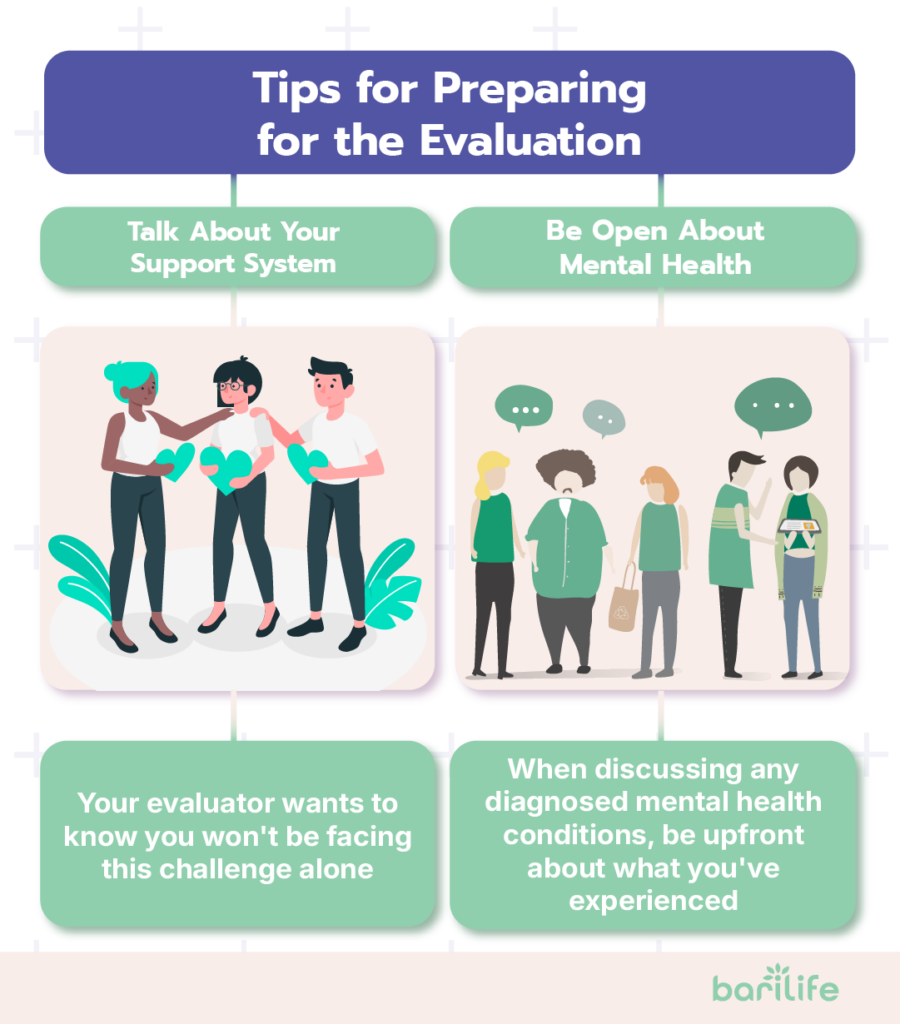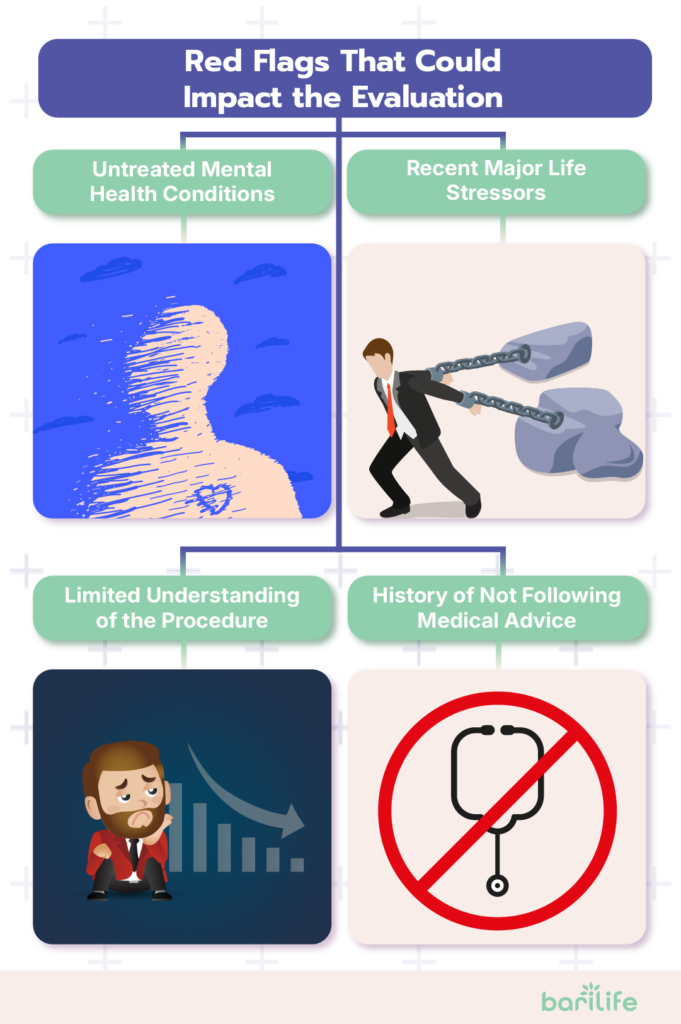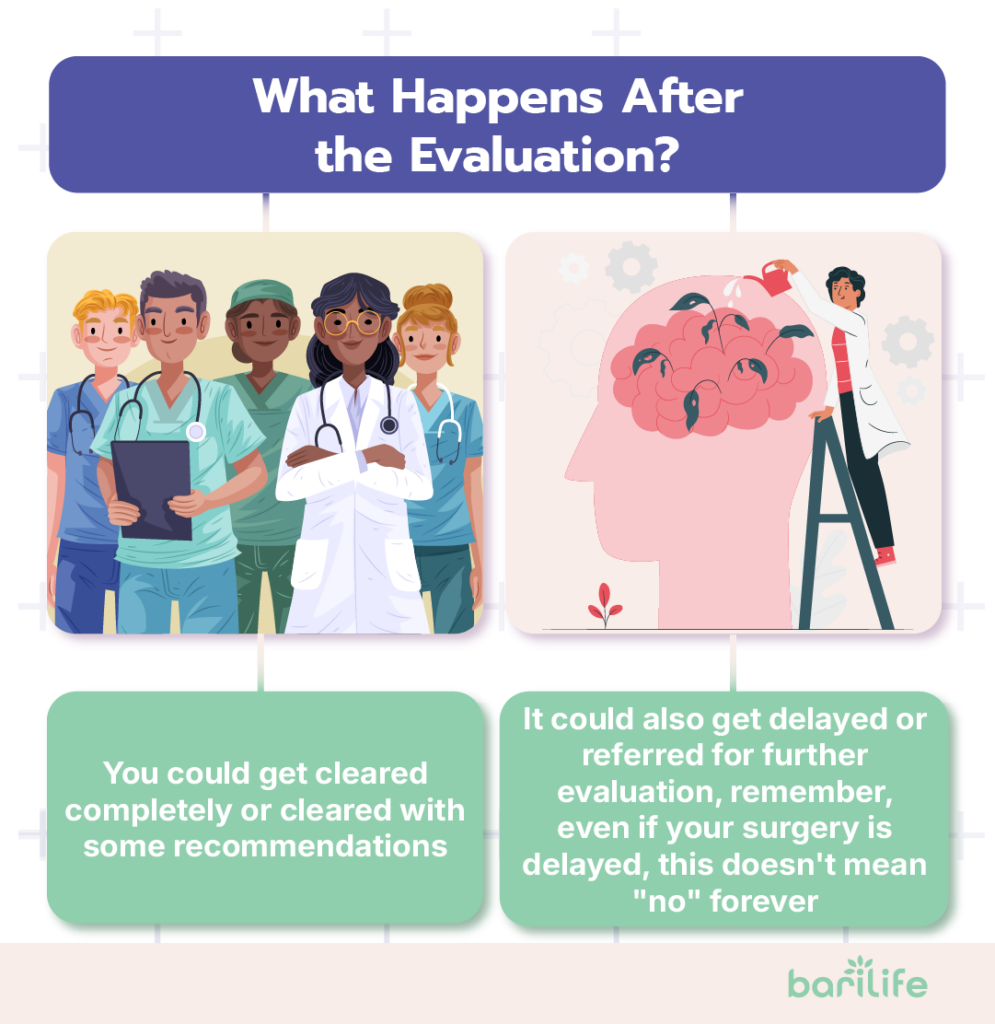Key Takeaways
- A bariatric psych evaluation is a way to make sure you are mentally prepared for bariatric surgery and the lifelong changes that come with it.
- You can prepare yourself for the evaluation by learning about the required diet changes, having a clear “why” for undergoing surgery, and understanding realistic expectations.
- Any concerns that arise after a psych evaluation do not disqualify you from surgery but show areas that need a more in-depth assessment, education, or treatment.
Feeling nervous about your upcoming psych evaluation for bariatric surgery? You’re not alone. Many people worry about this step, but by understanding what to expect, you can calm your nerves and get a better chance at passing!
Having a bariatric psych evaluation is a great way to make sure you are mentally prepared for the lifestyle changes and potential challenges after bariatric surgery. It’s also an essential part of meeting bariatric surgery requirements before moving forward with the procedure.
This guide explains what a bariatric psych evaluation is, why it’s important, tips for preparing, and more.
Table of Contents
What Is a Bariatric Psych Evaluation?

A bariatric psych evaluation is a conversation with a mental health professional who wants to make sure you’re mentally prepared for the life changes that happen after bariatric surgery.
During this appointment, you’ll have an in-depth conversation that covers several important areas.
- Relationship with food: They’ll ask questions about your relationship with food and your weight history.
- Understanding of the procedure: The evaluator also needs to make sure you understand the procedure so they’ll discuss details about what will happen, the recovery process, and the lifelong changes you need to make afterward.
- Mental health background: They’ll also ask about your mental health background. They need to understand how you cope with stress and difficult emotions since these factors can greatly affect your success after surgery.
- Support system: Finally, you’ll talk about who your support system will be after surgery, whether it’s family, friends, or a private caretaker.
You’ll also be asked to fill out several questionnaires during the appointment, which will give the evaluator more insights about your situation. This test is meant to help you identify any challenges you might face so your healthcare team can help you succeed.
Why Is the Psych Evaluation Important?
This psych evaluation matters for several reasons.
First, it helps spot any issues that could make your emotional journey harder after surgery. Weight loss surgery isn’t just a physical change—it requires major lifestyle adjustments, which can be emotionally challenging.
Second, it ensures that you truly understand what you’re signing up for. This isn’t just a one-time procedure but a lifelong commitment to a new lifestyle.
Third, it helps your healthcare team create a support plan for you. Knowing your specific challenges, they can connect you with the right resources.
Finally, most insurance companies require this evaluation before approving your surgery. Additionally, the evaluation may determine if you meet the BMI for bariatric surgery eligibility criteria, ensuring that the procedure is appropriate for your health needs.
Tips for Preparing for the Evaluation

Here are several tips to help get you through the bariatric psych evaluation.
Be Honest
The most important advice for how to pass a bariatric psych evaluation is simple: tell the truth. Psych evaluators have a lot of experience working with surgery candidates and can usually tell when someone isn’t being completely honest.
Being open about your struggles doesn’t mean you’ll be denied surgery. In fact, knowing what your challenges are shows you’re self-aware and ready to work on them.
Show You’ve Done Your Homework
Your evaluator will want to see that you truly understand what you’re signing up for. When discussing the specific surgery you plan to have, discuss why you and your healthcare provider selected this type over other options.
The evaluator will be particularly interested in your understanding of the diet changes. Showing that you’ve researched how you will need to eat after surgery demonstrates you’re mentally preparing.
Beyond diet, you can also talk about the broader lifestyle changes you must make, such as getting regular exercise and eating mindfully. Explaining how you plan to incorporate these new habits shows you understand this is a whole-life commitment.
Have Realistic Expectations
When discussing how much weight you may lose after bariatric surgery and how quickly, show that you have reasonable expectations.
Acknowledge that weight loss typically happens rapidly in the first 6 months, then slows down and that reaching your lowest weight might take some time.
Also, let them know you understand there may be times when your weight loss stalls and what steps you can take to get back on track.
Talk about how surgery might help with your specific health problems. Being able to discuss your personal health goals shows you’re focused on wellness, not just appearance.
While wanting to look better is completely normal, evaluators worry when candidates focus exclusively on looks or speak about surgery as if it will magically transform their lives.

Talk About Your Support System
Your evaluator wants to know you won’t be facing this challenge alone.
Be specific about which family members and friends support your decision and how they’ve already shown their support.
Sharing concrete examples of how your loved ones have responded to your surgery plans gives the evaluator confidence that you have an emotional support system.
Be Open About Mental Health
Having mental health conditions doesn’t automatically disqualify you from surgery. What matters most is how well you understand and manage these conditions.
When discussing any diagnosed mental health conditions, be upfront about what you’ve experienced. Explain how you manage your symptoms daily whether it’s medication or self-care routines.
Whatever your healthy coping mechanisms are, sharing them shows the evaluator that you have the tools to handle difficult emotions without turning to food.
Red Flags That Could Impact the Evaluation
Knowing the red flags during your psych evaluation can help you prepare honest, thoughtful responses. Here are some to watch out for.
Untreated Mental Health Conditions
Mental health concerns that aren’t being actively treated might need to be addressed before surgery. Current substance misuse is also another huge concern because it may indicate you’re using substances to cope with emotions—a strategy that won’t be available after surgery.
If you have bipolar disorder, talk about how your medication regimen and therapy have helped stabilize your moods. Severe depression is another one that also requires attention because the physical and emotional challenges after surgery can sometimes make depressive symptoms worse.
If you have a history of disordered eating, discuss the treatment you’ve received and the progress you’ve made.
If you’re currently receiving treatment for any mental health condition, bring documentation from your provider. A letter stating that you’re stable, compliant with treatment, and capable of understanding and following post-surgical instructions can significantly strengthen your case.

Recent Major Life Stressors
Major life changes create stress that can make recovery complicated. The evaluator wants to ensure you have the emotional bandwidth to focus on healing. Recent big life changes like divorce, moving, or changing jobs demand adjustment and energy. If you’re in the middle of such a change, acknowledge it and explain how you’re managing.
Limited Understanding of the Procedure
Your evaluator needs to ensure you’re making a fully informed decision about a life-changing procedure. If you expect to reach your “dream weight” within months or believe you’ll never struggle with weight again, the evaluator will be concerned about potential disappointment and its impact on your mental health.
Not knowing about dietary restrictions after bariatric surgery is another major red flag.
You should also understand both short-term surgical risks and long-term concerns like nutritional deficiencies, excess skin, or the possibility of weight regain.
History of Not Following Medical Advice
Past behavior often predicts future behavior, so a history of not following through with medical recommendations raises legitimate concerns about your post-surgery compliance.
Discuss specific strategies you’ll use to stay on track. These might include using reminder apps for taking vitamins, scheduling all follow-up appointments in advance, keeping a food journal, or having an accountability partner who checks in on your progress.
Most importantly, explain why you’re committed to following guidelines this time.
What Happens After the Evaluation?
After your evaluation, the mental health professional will carefully review all the information they’ve gathered during your session. You’ll generally receive one of four possible outcomes:
- Cleared For Surgery: You’re psychologically ready for bariatric surgery with no significant concerns.
- Cleared With Recommendations: You’re approved for surgery, but the evaluator has identified areas where additional support might improve your chances of long-term success.

- Delayed Approval: Certain issues should be addressed before proceeding with surgery.
- Referral For Further Evaluation: This happens when the standard psychological evaluation reveals areas needing more in-depth assessment.
Remember, even if your surgery is delayed, this doesn’t mean “no” forever.
Many people who are initially delayed are eventually approved after addressing the identified concerns.
Psych evaluators just want to make sure you have the best possible outcome, not just immediately after surgery but for years to come.
Conclusion
A bariatric psych evaluation is not meant to be a roadblock—it’s a crucial step in ensuring your long-term success after weight loss surgery. By preparing thoroughly, being honest, and demonstrating your commitment to the necessary lifestyle changes, you can approach the evaluation with confidence.
Remember, this process is designed to help you, not to disqualify you. If any concerns arise, they simply indicate areas where additional support or preparation may be needed. With the right mindset, education, and support system, you’ll be well on your way to a healthier future.
How Bari Life Can Help
Bari Life offers several bariatric vitamins and supplements designed to meet your nutritional needs before and after surgery. Whether you’re looking for bariatric multivitamins or a liquid bariatric vitamin for easy absorption, Bari Life provides complete, easy-to-follow regimens that support your long-term health.
In addition to essential vitamins, Bari Life also offers bariatric protein shakes and bariatric protein bars to help you maintain proper nutrition while staying on track with your weight loss goals. If you prefer convenient options, you can try bariatric vitamins chewable or bariatric calcium chews for easy daily supplementation.
For those needing extra support, Bari Life provides a bariatric multivitamin with iron to help prevent deficiencies and a bariatric probiotic to promote digestive health. If you’re concerned about thinning hair, bariatric vitamins for hair loss can help you maintain strong, healthy hair post-surgery.
To satisfy cravings without compromising your nutrition, Bari Life also offers bariatric snacks that are both delicious and diet-friendly.
Take the next step in your bariatric journey by exploring Bari Life’s specialized products. Visit Bari Life’s website to find the right supplements for you!
If you want to learn more, why not check out these articles below:
- What is a Bariatric Patient?
- Can You Have Bariatric Surgery If You Have H Pylori?
- How To Get Bariatric Surgery Fast?
- How Quickly Can I Get Bariatric Surgery?
- Am I a Candidate For Bariatric Surgery?
- What Can Disqualify You From Bariatric Surgery?
- Is Bariatric Surgery Right For Me?
- When is Bariatric Surgery Recommended?
Resources
Francois, Z., et al. (2024). Psychiatric Complications of Bariatric Surgery. Stat Pearls.



What are your tips and tricks to post-bariatric success?